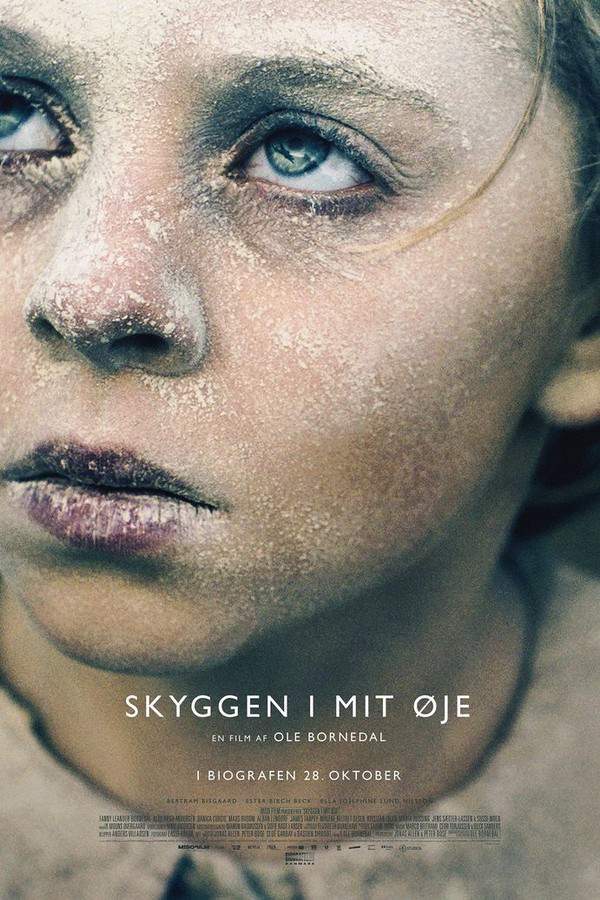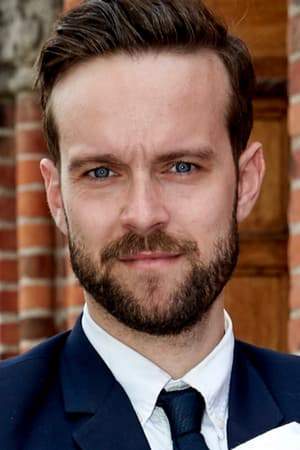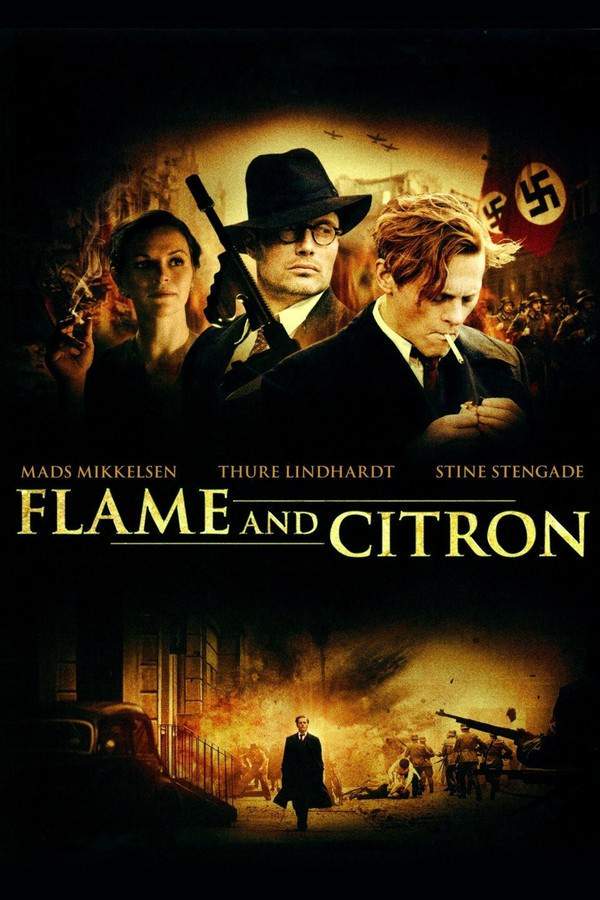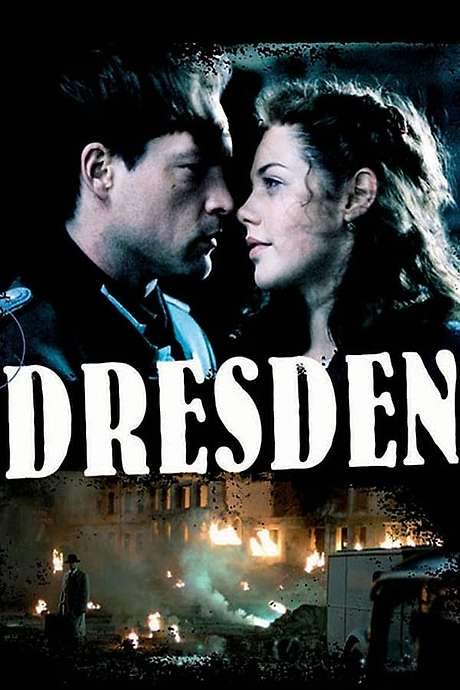The Bombardment 2022

During World War II, the Royal Air Force plans an attack on the Gestapo headquarters in occupied Copenhagen. A bomber crashes during the mission, and subsequent planes mistakenly drop their bombs on a French school. This tragic error results in the deaths of numerous children and innocent civilians, highlighting the devastating consequences of wartime mistakes and miscalculations.
Does The Bombardment have end credit scenes?
No!
The Bombardment does not have end credit scenes. You can leave when the credits roll.
Meet the Full Cast and Actors of The Bombardment
Explore the complete cast of The Bombardment, including both lead and supporting actors. Learn who plays each character, discover their past roles and achievements, and find out what makes this ensemble cast stand out in the world of film and television.

Caspar Phillipson
Bateson

Alex Høgh Andersen
Frederik

Bertram Bisgaard Enevoldsen
Henry

Dana Abed

Danica Curcic
Rigmor's Mother

Ella Josephine Lund Nilsson
Eva

Ester Birch
Rigmor

Fanny Bornedal

James Tarpey
Reggie

Jens Sætter-Lassen

Mads Hjulmand

Malene Beltoft Olsen
Eva's Mother

Maria Rossing
Henry's Mother

Morten Suurballe
Doctor

Olaf Johannessen

Patricia Schumann

Rikke Louise Andersson
Frederik's Mother

Susse Wold
External Links and Streaming Options
Discover where to watch The Bombardment online, including streaming platforms, rental options, and official sources. Compare reviews, ratings, and in-depth movie information across sites like IMDb, TMDb, Wikipedia or Rotten Tomatoes.
Ratings and Reviews for The Bombardment
See how The Bombardment is rated across major platforms like IMDb, Metacritic, and TMDb. Compare audience scores and critic reviews to understand where The Bombardment stands among top-rated movies in its genre.

The Movie Echo Score
The Bombardment delivers a compelling wartime portrait that resonates through its strong visual presentation and earnest performances. Critics note the film’s haunting cinematography and effective direction, while users highlight tension‑building scenes and an emotionally charged narrative. Some criticism is directed at occasional narrative clumsiness and under‑developed character moments, but the overall impact of the true‑story adaptation remains powerful. Consequently, the film offers a memorable experience despite uneven storytelling elements.
The Movie Echo Score Breakdown for The Bombardment

Art & Craft
In terms of art and craft, the film excels in direction, cinematography, and editing. Critics praise the beautifully shot, visceral imagery and users commend the striking lighting, camera angles, and special effects. Minor remarks about occasional unwieldiness do not diminish the overall technical proficiency. The visual execution stands out as a primary strength of the production.

Character & Emotion
Character and emotional depth receive generally positive feedback. Performances are described as fine and emotionally resonant, with users noting effective tension building and character fleshing. Some reviewers point to gaps in character development, suggesting a need for deeper exploration. Overall, the acting contributes meaningfully to the film’s emotional weight.

Story & Flow
The story’s core premise is praised for its relevance and the importance of recounting the tragedy. Critics acknowledge the linear narrative’s simplicity and the film’s intent to honor real events. However, several comments highlight narrative weaknesses, unwieldy structure, and occasional platitudinous moments. The plot engages but suffers from uneven pacing and originality.

Sensory Experience
Sensory experience, including soundtrack and visual style, is highlighted as a major asset. Reviews frequently mention haunting, visceral sound design and a striking visual palette that lingers after viewing. Users echo this sentiment, applauding the music, graphics, and overall aesthetic cohesion. The sensory elements strongly reinforce the film’s thematic impact.

Rewatch Factor
Rewatch factor is favorable, with multiple viewers citing repeated viewings and lasting appeal. Critics recommend the film for its thoughtful handling of difficult subject matter, and users report watching the movie several times and recommending it. While some find the material heavy, the combination of artistic merit and emotional resonance encourages repeat engagement.


100%
TOMATOMETER

90%
User Score

7.3 /10
IMDb Rating

78
%
User Score

3.6
From 98 fan ratings
Take the Ultimate The Bombardment Movie Quiz
Challenge your knowledge of The Bombardment with this fun and interactive movie quiz. Test yourself on key plot points, iconic characters, hidden details, and memorable moments to see how well you really know the film.
The Bombardment Quiz: Test your knowledge on the themes and events of 'The Bombardment' from 2022.
What was the primary goal of the Danish Resistance Movement?
To level the Gestapo headquarters
To rescue hostages
To gather intelligence
To sabotage German supply lines
Show hint
Full Plot Summary and Ending Explained for The Bombardment
Read the complete plot summary of The Bombardment, including all major events, twists, and the full ending explained in detail. Explore key characters, themes, hidden meanings, and everything you need to understand the story from beginning to end.
The Danish Resistance Movement continuously urged the British Forces to target the Gestapo headquarters located at the Shell House in Copenhagen. The Gestapo kept resistance members on the top floor, utilizing them as human shields in case of an air raid.
In February 1945, Henry (Bertram Bisgaard Enevoldsen) was cycling through the verdant meadows of Jutland when he heard a violent explosion. Driven by curiosity, he discovered a vehicle engulfed in flames, and to his horror, the occupants inside were still alive. This traumatic event marked a turning point for Henry, instilling in him a phobia of open spaces and rendering him mute. Seeking help, his mother (Maria Rossing) took him to a doctor who had an unconventional approach, often referring to him as a “sissy” in a misguided effort to break through Henry’s silence.
Subsequently, Henry’s mother brought him to Copenhagen to stay with her sister, Rigmor’s Mother (Danica Curcic). During this time, he met his cousin, Rigmor (Ester Birch), whose vibrant chatter and resilient spirit contrasted sharply with Henry’s newfound silence. Accompanying them was another girl named Eva (Ella Josephine Lund Nilsson), both curious about the reason behind Henry’s quietness and his gaze toward the sky. Rigmor, ever the optimist, pointedly remarked that even Eva had witnessed death yet could still speak, insisting that Henry would eventually find his voice again.
Meanwhile, inside the Shell House, resistance members like Svend Nielsen (Casper Kjær Jensen) faced dire circumstances. For Henry, the act of walking beneath open skies became a daunting challenge until Rigmor devised a clever solution, using a rope from her home to guide him, thereby restoring some of his confidence.
As the story unfolds, Sister Teresa (Fanny Bornedal), a staunch believer grappling with her faith, encounters Frederik (Alex Høgh Andersen), a conflicted Gestapo officer. Their interactions spark a forbidden romance, filled with tension and complexity. One fateful day, Eva’s father reprimands her for skipping breakfast, pushing her into a day that would soon take a dark turn.
On the same day of the British air raid aimed at the Gestapo headquarters, the planes mistakenly bombed the school where Henry, Eva, and Rigmor attended. While Eva felt faint from hunger, she and Henry sought relief in the restroom. In a moment of bravery, Frederik, having left the forces, returned to assist when he witnessed the devastation.
As chaos ensued, Rigmor and Sister Teresa became trapped under the rubble, with water rapidly rising around them. In a heroic attempt, Frederik endeavored to rescue Teresa, but as the weight above her was lifted, she leapt into the water to save Rigmor, tragically leading to their demise. Henry and Eva, however, managed to survive the ordeal.
In the aftermath, Henry was tasked with writing down the names and details of survivors, which he hurried to deliver at the designated theatre where anxious parents gathered for news. As he helped the rescuers, he assured Eva’s worried mother that her daughter had returned home, blissfully unaware that Eva was back inside, eating the very cold porridge that had caused her father’s earlier scolding.
Through a tapestry of bravery, innocence, and the heavy burden of trauma, the story beautifully captures the resilience of childhood and the powerful bonds that help heal even the deepest scars.
Uncover the Details: Timeline, Characters, Themes, and Beyond!

Coming soon on iOS and Android
The Plot Explained Mobile App
From blockbusters to hidden gems — dive into movie stories anytime, anywhere. Save your favorites, discover plots faster, and never miss a twist again.
Sign up to be the first to know when we launch. Your email stays private — always.
Watch Trailers, Clips & Behind-the-Scenes for The Bombardment
Watch official trailers, exclusive clips, cast interviews, and behind-the-scenes footage from The Bombardment. Dive deeper into the making of the film, its standout moments, and key production insights.
The Bombardment Themes and Keywords
Discover the central themes, ideas, and keywords that define the movie’s story, tone, and message. Analyze the film’s deeper meanings, genre influences, and recurring concepts.
The Bombardment Other Names and Titles
Explore the various alternative titles, translations, and other names used for The Bombardment across different regions and languages. Understand how the film is marketed and recognized worldwide.
Similar Movies To The Bombardment You Should Know About
Browse a curated list of movies similar in genre, tone, characters, or story structure. Discover new titles like the one you're watching, perfect for fans of related plots, vibes, or cinematic styles.
Quick Links: Summary, Cast, Ratings, More

What's After the Movie?
Not sure whether to stay after the credits? Find out!
Explore Our Movie Platform
New Movie Releases (2026)
Famous Movie Actors
Top Film Production Studios
Movie Plot Summaries & Endings
Major Movie Awards & Winners
Best Concert Films & Music Documentaries
Movie Collections and Curated Lists
© 2026 What's After the Movie. All rights reserved.






























